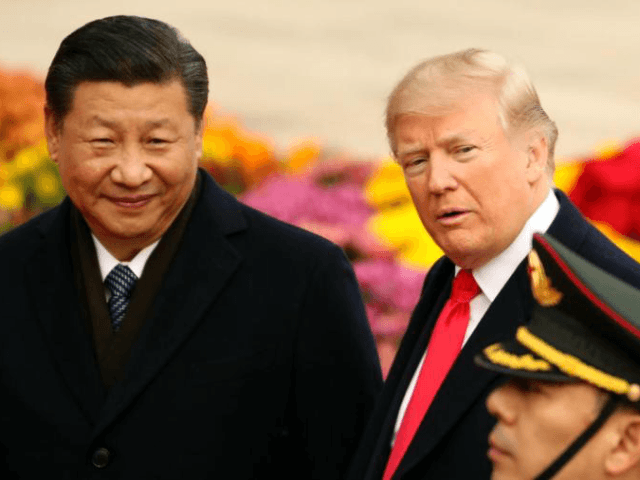The state-controlled news outlet Xinhua published a list of “major consensus” points on Thursday that it claims President Donald Trump and his Chinese counterpart Xi Jinping agreed upon, including “fighting terrorism” and repatriating fugitives.
As many Chinese people who the communist state has persecuted for human rights advocacy, unauthorized religious activity, or other legal acts of expression in the free world flock to the United States, the latter highlights a major wedge issue between Beijing and Washington.
The Xinhua list covers extensive ground, from the presidents agreeing to “have broad common interests and important responsibility for protecting world peace” to agreeing to “display the strategic and leading role of head-of-state diplomacy.”
It also includes a number of topics that the Xi regime has prioritized, including an affirmation of the “One China” policy, which rejects Taiwan’s sovereignty, and a vow to “prevent each other from becoming a paradise for fugitives.”
Trump had inadvertently challenged the One China policy before his inauguration by accepting a congratulatory call from Taiwanese President Tsai Ing-wen and recently rejected Chinese pressure to prevent Tsai from entering the United States.
Trump has also stood firm against repatriating one particularly controversial “fugitive”: billionaire Guo Wengui, known online by his nom de plume Miles Kwok, who the Chinese government accuses of a variety of corrupt acts. Guo, in turn, has named some of the highest-ranking members of the Communist Party of China (CPC) as exorbitantly corrupt themselves, including the former head of China’s national anti-corruption campaign, Wang Qishan. Xi removed Wang from his post in October during the CPC Congress.
Multiple reports indicate that China has used those close to Trump to pressure him to extradite Guo, including American casino magnate Steve Wynn. Trump has not acted against Wuo, however, who has continued to denounce the authoritarian regime from America.
While not all fugitives from the law, more Chinese citizens receive asylum status in the U.S. than citizens of any other country. Nearly 6,000 Chinese individuals received that status in 2015.
Trump and Xi reportedly also agreed on working to “make positive achievements in repatriating illegal immigrants.” While Trump campaigned heavily for the presidency on ensuring a secure border for Americans, China’s major “illegal immigration” concern is North Korean defectors, who often transit through China before reaching final sanctuary in South Korea. China routinely details and deports North Korean defectors back home, where trying to leave the country without permission from the Kim regime is considered “treachery against the nation” and punished severely. While the UN has repeatedly encouraged China to cease treating North Korean refugees as illegal aliens, Beijing continues to refuse to accept them.
The list of agreements concludes with promises to “offer assistance to Iraq” and “stand by the ‘Afghan-owned and Afghan-led’ way to realize the peaceful reconstruction of Afghanistan.”
President Trump has committed to a long-term entanglement in Afghanistan, which he has insisted cannot be held to a deadline. Chinese Foreign Ministry spokeswoman Hua Chunying told reporters that the conversation leading to this agreement involved substantial discussion of the Afghanistan situation.
“South Asia and Afghanistan figured prominently in today’s talks as both the leaders mentioned it in their briefings,” she said. “After the talks, Trump said terrorists are a threat to humanity and that he and Xi will ‘stop radical Islamic terrorism.'”
“The two sides believe that maintaining the stable and constructive relations between Afghanistan and its neighboring countries is of great significance to the peace and reconstruction process in Afghanistan,” Hua added on Thursday. “They support an Afghan-led and Afghan-owned peace and reconstruction process, call on all relevant parties in Afghanistan to achieve extensive and inclusive national reconciliation through political negotiation at an early date and stand ready to play a positive role through such mechanisms as the Quadrilateral Coordination Group of Afghanistan, China, Pakistan and the United States. ”
China’s western Xinjiang region, home to its Muslim Uighur minority, borders Afghanistan and is home to a radical Islamic terrorist group, the East Turkestan Islamic Movement. The Syrian ambassador to Beijing has stated that up to 5,000 Chinese citizens have traveled to that country to join the Islamic State. China has used the threat of jihad to crack down on the free practice of religion in Xinjiang, forcing families to hand over “unapproved” copies of the Quran and mandating GPS tracking on all cars in the province.

COMMENTS
Please let us know if you're having issues with commenting.